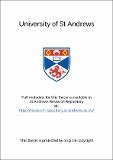Files in this item
Development of a vaccine against AIDS based on SIV Tat
Item metadata
| dc.contributor.advisor | Randall, R. E. | en |
| dc.contributor.author | Diassiti, Angelina | en |
| dc.coverage.spatial | 208 p | en |
| dc.date.accessioned | 2021-04-08T08:57:24Z | |
| dc.date.available | 2021-04-08T08:57:24Z | |
| dc.date.issued | 2003 | |
| dc.identifier.uri | https://hdl.handle.net/10023/21880 | |
| dc.description.abstract | Tat protein (Trans Activator of Transcription) is essential for efficient lentiviral transcription and completion of a lytic infection. During lentiviral infection, Tat is found both inside cells and in the extracellular medium, and extracellular Tat is responsible for some disease symptoms and toxicity during lentiviral infection. The mode of action of Tat makes it a good target for immunisation that would generate both humoral and cellular immune responses, while specific interdiction of the extracellular protein could alleviate some deleterious phenomena attributed to Tat. In the course of this study, the immunogenic potential of recombinant Tat protein from SIVmac32H(J5) was evaluated in BalbC mice and in Rhesus macaque monkeys. Recombinant Tat was initially expressed in very low amounts in E. coli, but optimisation of the Tat coding sequence for translation in the bacterial host significantly improved protein expression. Aiming to purify Tat on the basis of the affinity tag Pk (engineered on the recombinant Tat protein), a method for Pk-affinity purification was successfully developed and is available for general use. When evaluated in animal immunisation studies, Tat protein was shown to be immunogenic in the absence of a carrier or adjuvant. Furthermore, Tat generated immune responses to poorly immunogenic proteins physically linked to it, with evidence for Tₕ1-type responses in mice. There was even a suggestion that Tat was modifying the established function of the adjuvant alum towards the development of antigen-specific Tₕ1-type responses. Tat showed potential as an antigen in a lentiviral vaccine that would induce antibody and Tₕ1 responses. Furthermore, Tat being able to generate T ₕ1- type responses to co-administered antigens would be a very useful antigen carrier to generate immunity against pathogens that are cleared by Tₕ1 -based immunity. | en |
| dc.language.iso | en | en |
| dc.publisher | University of St Andrews | en |
| dc.subject.lcc | RC607.A26D5 | |
| dc.subject.lcsh | AIDS vaccines | en |
| dc.subject.lcsh | Simian viruses | en |
| dc.title | Development of a vaccine against AIDS based on SIV Tat | en |
| dc.type | Thesis | en |
| dc.type.qualificationlevel | Doctoral | en |
| dc.type.qualificationname | PhD Doctor of Philosopy | en |
| dc.publisher.institution | The University of St Andrews | en |
This item appears in the following Collection(s)
Items in the St Andrews Research Repository are protected by copyright, with all rights reserved, unless otherwise indicated.

